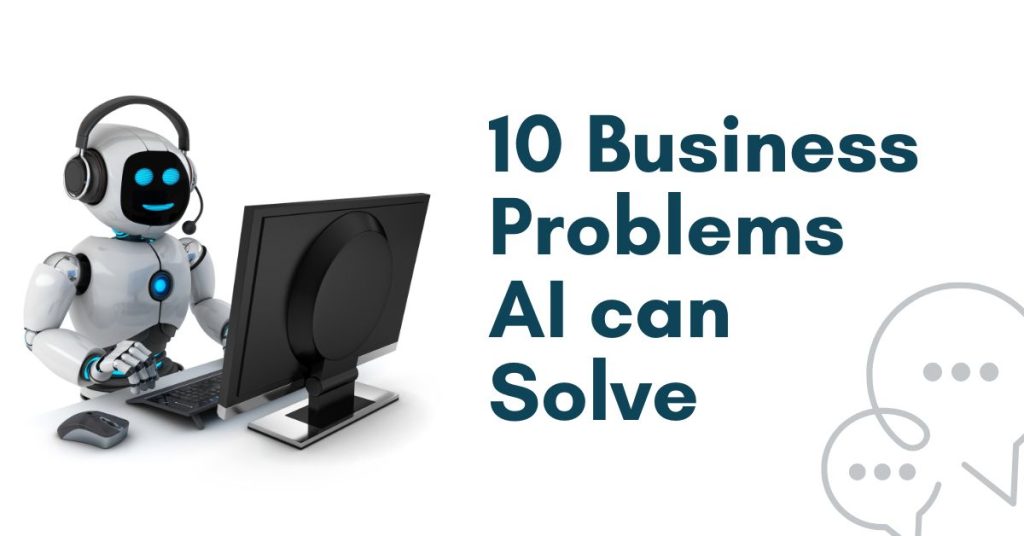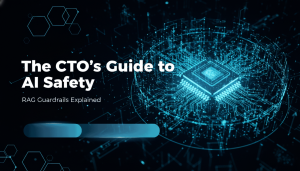As a business owner, you know that success is not just about having great products or services but also about efficiently managing your operations. However, there are many hurdles that come in the way of achieving this efficiency. From customer support to inventory management, and quality control to cybersecurity, businesses face numerous problems that can have significant impacts on their bottom line. That’s where AI comes in. In this blog post, we will discuss ten common business problems and how AI can help solve them. Businesses can use machine learning algorithms and natural language processing (NLP) to improve their operations and customer satisfaction and drive growth.
Read on to discover how AI can solve your business problems.
Customer support
One of the most significant challenges businesses face is providing efficient and timely customer support. With AI-powered chatbots, companies can offer 24/7 customer service without exhausting human agents.
These AI chatbots can also analyze vast amounts of customer data to provide customized recommendations and improve overall customer experience.
Chatbots that use natural language processing technology can understand and respond to customer complaints and inquiries in real-time.
Automating repetitive tasks like responding to common inquiries frees up more time for employees to focus on higher-level tasks, increasing employee productivity and efficiency. With AI’s help, companies can proactively address potential issues before they become problems, leading to better customer satisfaction rates.
Improved response time and efficiency
In this competitive business world, it’s important for businesses to respond to customers’ queries and problems quickly. This is where AI can come in handy by providing improved response time and efficiency.
With AI-powered chatbots providing 24/7 support, businesses can ensure that their customers’ inquiries are addressed promptly. This not only saves time but also improves overall customer satisfaction and loyalty.
Additionally, AI can analyze customer data to identify patterns and predict potential issues before they occur, allowing businesses to take proactive measures.
Furthermore, automated responses and personalized recommendations based on customers’ history can reduce the workload of human agents and free up their time for more complex tasks.
By reducing response times and increasing efficiency, AI-powered customer support can save businesses time and money while improving their bottom line.
Chatbots and virtual assistants for 24/7 availability
In today’s fast-paced world, customers expect prompt and efficient service from businesses at all times. This is where AI-powered chatbots and virtual assistants come in handy, providing 24/7 availability to customers.
Chatbots can handle routine customer inquiries, offering quick and accurate responses while freeing up human agents to focus on more complex issues.
Virtual assistants, on the other hand, can offer personalized recommendations to customers based on their purchase history and preferences, providing a tailored experience that improves overall satisfaction and loyalty.
By implementing AI-powered customer support solutions like chatbots and virtual assistants, businesses can save time and resources while enhancing the customer experience.
Personalized communication through NLP analysis and intent prediction
In today’s competitive business landscape, providing a personalized customer experience is crucial for building brand loyalty and customer retention.
One way to achieve this is through the use of AI-powered communication tools that leverage Natural Language Processing (NLP) and intent prediction.
Through the analysis of customer inquiries, AI can not only provide quick and accurate responses but also understand the context behind them to offer personalized recommendations.
By guiding customers through the support process more efficiently, businesses can improve response times and increase overall customer satisfaction.
Moreover, AI-powered chatbots can handle repetitive tasks, freeing up human agents to focus on more complex issues. And with increased efficiency and accuracy in customer support comes reduced costs for businesses, making it a win-win solution for both parties involved.
Biometrics for enhanced security
In today’s fast-paced business world, data breaches and cyber attacks have become more common than ever. As a result, companies are increasingly turning to biometric technology to enhance security in customer support interactions.
By using unique physical characteristics such as fingerprints or facial recognition, biometric authentication can verify a customer’s identity quickly and efficiently. This not only reduces the risk of fraud but also improves the overall safety of customer data.
In addition to providing enhanced security measures, implementing biometric authentication can streamline the customer support process by eliminating the need for passwords or other forms of verification.
Demand forecasting
Demand forecasting is a critical aspect of inventory management that can make or break businesses. Inaccurate demand forecasting can lead to overstocking, which ties up valuable resources in unsold inventory, or stockouts that result in lost sales and unhappy customers.
However, with the help of AI, demand forecasting has become more accurate and efficient than ever before. By analyzing historical data and predicting future trends, AI-powered demand forecasting can help businesses make informed decisions about production, sales, and inventory levels.
Moreover, incorporating AI into demand forecasting can also improve customer satisfaction by ensuring that products are available when needed. Predicting future trends accurately enables companies to manage their inventory levels more effectively, reducing waste and saving money.
AI-powered demand forecasting also frees up resources that would otherwise be spent on manual data analysis. Ultimately, utilizing AI in demand forecasting reduces costs while enhancing efficiency and customer experiences.
Improved accuracy over time
With demand forecasting being a crucial component of business planning, accuracy is imperative. AI-assisted demand forecasting can help businesses achieve greater accuracy over time by identifying patterns in historical data and using them to predict future trends.
As the algorithms continue to learn and analyze new data, the accuracy of demand forecasting can improve exponentially. With better forecasting capabilities, businesses can make more informed decisions about inventory management, pricing, marketing strategies, and production planning.
Ultimately, incorporating AI into demand forecasting can help companies gain a competitive advantage and increase profits.
Efficient manpower planning
Efficient manpower planning is essential for businesses to optimize their workforce allocation and improve productivity. By accurately predicting future demand for products or services, companies can ensure that they have the necessary staff with the required skills to meet customer needs.
AI-powered demand forecasting tools can analyze historical data and use machine learning algorithms to provide accurate predictions, allowing businesses to efficiently plan their workforce. This approach can lead to better resource utilization, cost savings, and improved employee satisfaction.
Moreover, incorporating AI into manpower planning can help automate the process of allocating employees based on predicted demand and staffing requirements. This not only saves time but also results in more efficient use of resources while ensuring that the workload is evenly distributed among employees.
Additionally, AI-powered manpower planning can take into account factors such as employee availability and workload, which helps managers make informed decisions about staffing levels and reduces the risk of staff burnout.
Markdown and discount optimization
Optimizing markdowns and discounts is crucial for businesses looking to stay competitive in today’s market. With AI-powered solutions, companies can effectively analyze past sales data and predict future demand, allowing them to adjust prices accordingly.
By doing so, businesses can increase their sales revenue while minimizing loss of profit.
Furthermore, AI algorithms can help identify the right time to offer discounts or promotions based on customer behavior and preferences. This personalized approach to pricing can improve customer satisfaction and loyalty, ultimately resulting in increased profits for the business.
Leveraging AI technology for markdown and discount optimization is a smart business strategy for boosting revenue and staying ahead of the competition.
Predicting customer needs and behavior
In today’s fast-paced business environment, predicting customer needs and behavior accurately is crucial to success. Thanks to AI-powered demand forecasting tools, businesses can now analyze data from various sources, including social media, sales history, and market trends, to create accurate forecasts.
With this information, businesses can optimize their inventory management, production planning, and marketing strategies. By reducing waste and ensuring that the right products are available at the right time, AI-powered demand forecasting can increase efficiency and profitability for businesses.
Incorporating AI into demand forecasting helps companies stay ahead of the curve by providing them with a competitive edge through accurate predictions of customer needs and preferences.
Fraud detection
In today’s digital age, businesses are increasingly vulnerable to fraud. Fraudsters can use various techniques, such as identity theft, phishing, and malware attacks, to gain access to sensitive data and steal money from companies.
Fraud detection is crucial for protecting businesses from financial losses and reputational damage. AI can help in detecting and preventing fraud by analyzing large amounts of data quickly and accurately. Machine learning algorithms can identify patterns of fraudulent behavior and flag suspicious transactions in real time.
Biometrics, such as facial recognition or fingerprint scanning, can also be used to prevent identity theft. By incorporating AI into fraud detection systems, businesses can minimize the risk of financial loss due to fraudulent activity.
Identifying fraudulent transactions through machine learning algorithms
Fraudulent transactions are a major concern for businesses, and identifying them can be a challenging task.
However, machine learning algorithms powered by AI can help identify suspicious patterns and flag potentially fraudulent behavior in real time.
These algorithms can analyze large amounts of transactional data and detect anomalies that might go unnoticed by human analysts.
By automating this process, businesses can significantly reduce the risk of financial loss due to fraud.
Furthermore, these systems can learn from historical data to continually improve their accuracy over time, ensuring that they remain effective against even the most sophisticated fraudsters.
Biometrics for identity theft prevention
In today’s digital age, data breaches, and identity theft have become serious concerns for businesses of all sizes. That’s where biometrics comes into play as an effective solution for identity theft prevention.
Biometric identification uses distinct biological characteristics such as facial recognition or fingerprints to confirm a person’s identity.
This technology ensures that only authorized individuals have access to sensitive information, preventing unauthorized access and data breaches.
AI-powered biometric systems can quickly detect and flag any suspicious activity, helping companies identify and prevent fraudulent behavior before it causes significant damage.
Integrating biometrics into other security measures, such as two-factor verification, allows companies to protect their sensitive data and build customer trust by offering a reliable and secure platform.
Investing in AI-powered biometric systems can go a long way in safeguarding a company’s reputation and improving its overall security posture.
Inventory management
Efficient inventory management is essential for any business. However, it can be a complex process that requires constant monitoring and forecasting to prevent stockouts or overstocking.
This is where AI-powered inventory management systems come in handy. By analyzing past sales data and predicting future demand, these systems can automate the reordering process and ensure optimal inventory levels at all times.
Smart inventory management can also help reduce waste and improve efficiency in the supply chain by identifying slow-moving products and suggesting ways to move them out of inventory faster.
Moreover, real-time monitoring and tracking of inventory levels enable companies to predict stock shortages and prevent overstocking.
With AI-enabled inventory management systems, businesses can save time and resources while maintaining optimal inventory levels to meet customer demand.
Real-time monitoring and tracking of inventory levels
Maintaining an accurate inventory is crucial for the success of every business, but it can be a challenging task. Real-time monitoring and tracking of inventory levels can help businesses avoid overstocking or understocking.
With AI-powered inventory management systems, companies can receive accurate and up-to-date information on inventory levels. These systems can also identify patterns in demand, helping businesses optimize their inventory and reduce waste.
Automated reordering systems can be set up based on real-time data, ensuring that stock levels are always maintained.
AI-powered inventory management can improve efficiency, reduce costs, and increase customer satisfaction.
By implementing real-time monitoring and tracking of inventory levels with AI technology, businesses can stay ahead of the competition and meet customer demands with ease.
Prediction of stock shortages and overstocking
Optimizing inventory levels is crucial for any business, but it can be a challenging task. Fortunately, AI can assist in predicting stock shortages and overstocking to ensure companies never run out of or end up with excess stock.
By analyzing past sales data and external factors such as seasonal trends and weather patterns, AI-powered inventory management systems can accurately predict future demand for products.
This helps businesses avoid stock shortages and overstocking, which can result in lost sales and increased costs.
Furthermore, real-time monitoring of inventory levels enables businesses to make informed decisions about restocking and pricing strategies based on accurate and up-to-date data.
AI-powered inventory management provides an efficient solution that optimizes inventory levels and improves the bottom line of any business.
Quality control
In production processes, quality control is crucial for ensuring customer satisfaction and maintaining brand reputation. However, manual quality checks can be time-consuming and prone to human error. This is where AI-powered quality control comes in, automating the inspection process and improving efficiency.
By using machine learning algorithms to identify patterns in data, AI can quickly detect defects or anomalies in products, even on a microscopic level.
Additionally, automated vision systems can inspect product surfaces for inconsistencies or defects that may be invisible to the naked eye.
With AI-driven quality control, businesses can improve their bottom line by reducing waste, improving production efficiency, and ensuring high-quality products for their customers.
Automated inspection and defect detection in production
Manufacturing industries often struggle with maintaining quality control during the production process. This is where automated inspection and defect detection comes into play, with AI-powered machines able to detect defects in real time.
By automating this process, businesses can reduce human error and ensure consistent product quality.
Moreover, AI-powered inspection systems are more efficient than human inspectors, reducing costs and increasing productivity. They also provide predictive analysis that helps prevent future problems and defects from occurring.
By implementing AI-powered quality control systems, companies can improve their manufacturing processes, boost customer satisfaction and maintain their brand reputation.
Financial analysis
Financial analysis is important for every business. However, it can be time-consuming and prone to errors. Fortunately, AI can help automate many financial analysis processes, freeing up valuable time for employees to focus on other important tasks.
With real-time reporting and visualization of financial data, businesses can make informed decisions quickly.
Additionally, AI algorithms can identify patterns and trends in financial data that may not be immediately apparent to humans, making it a powerful tool for predicting market trends and investment opportunities.
By implementing AI-powered financial analysis systems, businesses can improve forecasting accuracy and aid in budgeting decisions, giving them an edge in today’s competitive market.
Real-time reporting and visualization of financial data
Businesses today generate a vast amount of financial data, from sales figures to expenses, which can be overwhelming to analyze. This is where AI-powered real-time reporting and visualization come into play. AI algorithms can help companies to analyze their financial data in real-time and get its visual representation.
This makes it easier to spot trends and patterns quickly, which allows businesses to make informed decisions on time.
AI-powered real-time reporting also provides businesses with the flexibility to adjust their strategies on the go.
By identifying market trends or changes in customer behavior through real-time data analysis, companies can adapt their marketing strategies or adjust their product offerings to meet the changing needs of their customers.
This can not only help companies stay competitive but also lead to increased profitability over time.
Predicting market trends and investment opportunities
In the rapidly changing business landscape, predicting market trends and identifying investment opportunities are crucial for success.
With the help of AI-powered financial analysis, businesses can gain real-time insights into market changes and make informed decisions quickly.
By analyzing large amounts of financial data, AI algorithms can identify patterns that may not be immediately apparent to humans, providing a competitive advantage for businesses.
Additionally, AI can assist with automating financial analysis processes, saving time, and reducing errors associated with manual analysis.
AI can help businesses stay ahead of the competition by identifying emerging trends and opportunities in the market.
Recruitment and HR management
Recruiting and managing employees can be a challenging task for any business. Fortunately, AI technology is transforming the way HR departments operate.
With automated resume screening and candidate shortlisting, AI can help streamline the recruitment process, saving time and resources.
Additionally, sentiment analysis can provide insights into employee engagement and satisfaction, allowing HR teams to make data-driven decisions that improve retention rates.
AI-powered chatbots can also assist with onboarding and answering employee questions, reducing the workload of HR personnel.
By leveraging these tools, businesses can build a more efficient and effective HR department that supports their overall growth strategy.
Automated resume screening and candidate shortlisting
As businesses continue to grow, so does the pool of potential talent. In such a scenario, traditional recruitment processes can be time-consuming and require significant resources.
To address this issue, AI-based systems for automated resume screening and candidate shortlisting have emerged as a game-changer. By using machine learning algorithms, these systems can efficiently filter large volumes of resumes and identify top candidates based on their qualifications, experience, and skills.
Automated resume screening can save HR managers a significant amount of time and effort in the recruitment process, allowing them to focus on other tasks.
Moreover, it ensures that the best candidates are selected for the job by eliminating human error or bias.
With AI-powered systems for automated resume screening and candidate shortlisting becoming more prevalent in today’s job market, businesses can make their recruitment processes more efficient and effective.
Improved employee engagement and satisfaction through sentiment analysis
Creating a positive and engaged workforce is critical for any company’s success, and AI technology can play a vital role in achieving this goal. Through sentiment analysis, AI systems analyze employee feedback and identify areas where improvements can be made to increase employee satisfaction.
This analysis helps HR managers track the effectiveness of HR initiatives and identify patterns in employee sentiment over time. By identifying issues before they escalate, HR can take proactive measures to address problems that could otherwise lead to high turnover rates.
Furthermore, the use of chatbots powered by AI technology can improve recruitment processes by providing quick responses to candidate queries and scheduling interviews, freeing up valuable time for HR managers to focus on other areas of importance such as employee development and engagement.
Marketing and sales
Marketing and sales are critical components of any business strategy. Incorporating AI technology can help businesses gain a competitive edge by offering personalized marketing campaigns, improving customer engagement, and identifying emerging market trends.
By analyzing customer data, AI algorithms can identify patterns in consumer behavior and preferences. This helps businesses create targeted marketing campaigns that resonate with customers, increasing the likelihood of conversion.
AI-powered chatbots can also make customer service more efficient by handling inquiries quickly and accurately.
Automated lead generation tools can help sales teams identify high-quality leads more efficiently than traditional methods.
Additionally, AI-based pricing optimization can ensure that businesses set prices based on real-time market data, resulting in higher profit margins and increased revenue.
AI technology offers a range of benefits for businesses looking to improve their marketing and sales strategies.
In today’s fast-paced business world, providing a personalized experience to customers is crucial. Artificial intelligence can help companies achieve this by analyzing customer data and providing personalized product recommendations.
This approach not only increases customer satisfaction but also helps businesses drive sales. By using AI-powered product recommendation engines, companies can suggest products that are tailored to each individual customer based on their purchase history, browsing behavior, and preferences.
Moreover, these recommendation engines can be integrated into a company’s website or mobile app, making the shopping experience more seamless and enjoyable for the customer.
Personalization is the key to success in modern-day marketing, and AI is the tool that can help businesses achieve it efficiently and effectively.
Customer segmentation for targeted marketing campaigns
Businesses today face the challenge of finding their ideal target audience in an ever-expanding digital landscape. This is where customer segmentation comes in handy.
By using AI to analyze customer data, businesses can gain valuable insights into their customers’ behavior and preferences, allowing them to tailor their marketing campaigns more effectively.
Segmentation allows businesses to divide their customers into groups based on common characteristics such as demographics or online behavior. This information can be used to create targeted marketing messages that are more likely to resonate with each group, leading to better engagement and increased sales.
With the help of AI-powered tools, businesses can save time and resources while improving the effectiveness of their marketing strategies.
Research and development
Research and development are essential for staying ahead of the competition.
However, it can be time-consuming and expensive, with no guarantee of success. That’s where AI comes in – it can help businesses conduct R&D activities more efficiently and effectively.
With AI-powered tools, companies can identify new product opportunities, analyze market trends, and streamline the R&D process by automating repetitive tasks like data collection and analysis.
Moreover, machine learning algorithms can optimize product design and performance based on user feedback, while chatbots powered by AI can improve customer service and support by answering frequently asked questions (FAQs) and resolving issues faster.
Personalized marketing campaigns powered by AI also allow businesses to reach their target audience more effectively. By leveraging AI for research and development, businesses can save time and resources while accelerating innovation.
Accelerating innovation through machine learning algorithms
The integration of machine learning algorithms in research and development can significantly accelerate innovation. AI-powered tools can quickly analyze large amounts of data and identify patterns or trends that would be difficult or impossible for humans to detect.
By automating repetitive tasks such as data analysis and experimentation, businesses can streamline the R&D process and reduce costs while increasing accuracy.
This allows companies to be ahead of their competition by developing new products and services faster than their competitors.
Investing in AI-based research and development is essential for staying relevant and competitive in today’s rapidly changing market.
Cybersecurity
In today’s digital world, cybersecurity has become a critical concern for businesses of all sizes. With cyberattacks becoming more sophisticated and widespread, it is essential to have robust security measures in place that can detect and prevent threats before they cause significant damage.
AI-powered tools and algorithms offer a range of benefits in this area, from detecting suspicious activity to predicting potential vulnerabilities. By continuously monitoring networks and analyzing data, AI can help businesses stay one step ahead of cybercriminals and mitigate the risk of data breaches or other security incidents.
Predicting and preventing cyber-attacks through AI-powered threat detection
Cybersecurity has become an increasingly important concern for businesses across the globe. With cyber-attacks becoming more sophisticated and frequent, it is essential for companies to take preventative measures to protect their assets, employees, and customers.
AI-powered threat detection systems have emerged as a valuable solution to predict and prevent potential cyber threats. By leveraging machine learning algorithms, these systems can analyze vast amounts of data to identify patterns and anomalies that could indicate a possible attack on the company’s network.
Furthermore, implementing AI-powered cybersecurity solutions can help save time, reduce costs, and improve overall security posture. As such, companies that invest in AI-based threat detection will be better equipped to mitigate the risks associated with cybersecurity breaches in today’s fast-paced market.
Conclusion
AI is revolutionizing the way we do business by helping us solve complex problems. From customer support to inventory management, and demand forecasting to cybersecurity, AI can help your company tackle various business problems. By leveraging the power of AI, you can improve efficiency, accuracy, and security while reducing costs and increasing revenue.
If you’re interested in exploring AI solutions for your business problems, contact us today to discover how our AI development services can address your specific needs.



